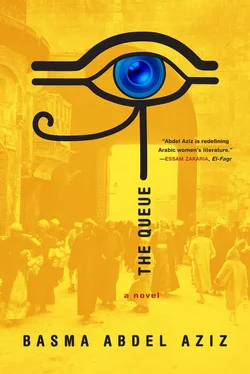Yehya began his search for the head nurse, but the queue was so vast that he couldn’t easily scan the crowds for her. He managed to search a small area, but it was just a drop in a bucket, while the queue was fathoms deep. He reasoned that he shouldn’t limit his search to the end of the queue; he didn’t think she would feel bound to the order of arrival and stay at the end. Besides, he knew that people often and easily switched places — he himself had skipped ahead of so many, and some people who arrived just a few weeks ago were now at the front, each thanks to his or her own methods or bargaining abilities. So he and Nagy agreed to divide the queue between them, setting forth from the same point and walking in opposite directions.
He had to stop and ask about her out loud every few feet; there was no other way to go about it. The only picture they had of her was the one in Nagy’s mind — the last time he’d been to the hospital, Sabah had led him to the nurses’ office and proudly pointed to a large frame filled with photographs of the doctors, nurses, and other hospital staff. She’d stepped close to the frame, stuck her finger on the neck of a middle-aged woman, and pointed her out: “Mrs. Alfat, the head nurse, and me standing next to her.” The people in the queue weren’t surprised by Yehya’s question; they were used to people asking for one another, and to hearing helpful strangers pointing them in the right direction. Sometimes photographs were distributed, of adults and children alike, lost amid the crowds of the queue. It happened at mealtimes especially, when news and rumors dwindled, the general sense of apprehension faded, and everyone’s attention turned to the person sharing food with them. Yehya met two nurses in his search, a technician and an eye doctor with her younger sister, but neither of them was Mrs. Alfat, and not a single person claimed to know her. Um Mabrouk volunteered to ask her customers, and instructed them to ask others in turn, explaining, “The head nurse is a real big shot, a distant relative of Yehya’s.”
Yehya and Nagy met back at their starting point having had no success. They were exhausted and convinced it would be impossible to keep searching without a thread to grasp at. At this rate, it would take nearly two months. They sat down to brainstorm a way to save time; they’d lost so much already. Nagy suggested that they ask for Ehab’s help, but Yehya rejected the idea outright. He wanted to keep the matter within the tightest circle possible. But then he remembered that this irksome journalist, who had offered them his friendship from the start, by pestering him relentlessly, had already learned a great deal about him. It was information that Nagy had disclosed with the best of intentions, but it meant that his situation was no longer a secret. Ehab already knew everything. And despite Yehya’s reservations, he couldn’t deny that Ehab and his fellow journalists had proven methods, when it came to investigating, that might help lead them to their goal: the whereabouts of the head nurse.
There was no need to surrender to mistrust, he realized, nor was there need to be so stubborn. He trusted Nagy, and Nagy in turn trusted Ehab. Time was moving swiftly, and with it things changed quickly. They could no longer predict what tomorrow would bring, or what future events might throw the world into confusion again. Nagy ordered a cup of coffee and took it with him as he went to look for Ehab, while Yehya left the queue to use the toilet. He walked away slowly and painfully, pressing his palm against his thigh to support his weight. Sweat streamed down his face. It poured down between his stitched brows and spread over his nose and mouth, intensifying the scorching blaze that emanated from his skin, as if his head had become a small sun.
He had to stop every two or three steps to catch his breath and wipe his face, while other people kept moving all around him. Some of those who knew him offered to assist him, while others ignored him, accustomed as they now were to his aversion to chit-chat and unnecessary gossip, and the pauses they left in conversation. The woman with the short hair waved to him and he nodded at her, unable to lift his arm and wave back because of the pain. She ran to catch up and stopped in front of him, out of breath. She inquired after his health and offered him a clean cotton handkerchief, telling him to keep it. Then she asked about his thoughts on the forgotten bag, the catalyst to the conflict that had erupted between her and the man in the galabeya a while back. She wasn’t sure where Yehya stood on the matter, she said, but she presumed he was on her side. From afar she’d noticed he’d developed a relationship with Ehab, the young journalist, the same one who’d intervened to rescue her from the situation she’d stumbled into, and then he’d become involved himself when he’d suggested how they could resolve the matter.
Yehya drew himself up taller at her question and stared at her. He’d completely forgotten about the entire affair. Recent developments and fresh troubles had accumulated around him and he could barely remember what had happened, apart from a few words and hazy images. But this woman seemed to have more than enough time for such things; she was clearly the type who went around sticking her nose in where it didn’t belong, stirring up trouble or chasing after it, until she got what she wanted. He promised her he would discuss it with Ehab, and pointed to his place in the queue to show her where he could usually be found, his expression revealing nothing. His face remained composed as he walked away, but once he had crossed to the other side of the road and was finally alone, he let the pain thunder through him again as he emptied his bladder.
There were dark droplets of blood discoloring his underwear and the pain now gnawed at him harder than before. He’d hoped things wouldn’t work out this way, turning from bad to worse. Tarek had explained so many possible outcomes during their first meeting: the most hopeful was that the bullet might surrender and settle somewhere safe, surrounded by the protective tissue that the body naturally forms around any foreign object that disturbs its natural integrity. Then all these elements would be become one: the bullet, tissue, and various unknown secretions forming a tranquil, untroublesome mass that would stay with him for the rest of his life. But it seemed the bullet had chosen another path, launching an incursion into his intestines, puncturing them and perhaps soon poisoning his blood.
He tried to dispel these unsettling thoughts and replaced them with more uplifting ones: Amani storming the hospital basement, striking down whoever opposed her and returning with the X-ray; Nagy tying Tarek up, then forcing him to perform the operation; an ornate wedding dais at the beginning of the queue, in front of the Gate, and a huge picture of him and Amani placed on the corner instead of the NO ENTRYsign; and finally, the two of them wrapped in a long embrace, lovingly entangled in each other, instead of this uncomfortable silence that had settled between them since his injury. He straightened himself up as much as the pain would allow and decided he would go to Ehab himself.
Patient History
The patient, Yehya Gad el-Rab Saeed, had an ordinary childhood and adolescence; he did not contract any illnesses of note, has not previously undergone surgery, and has no family history of disease. He has suffered episodes of anxiety and irritability, which, during his final years of university, led him to commit certain acts that may be described as rebellious. His supervisors recommended follow-up in this regard. These episodes returned several months after he had graduated and secured appropriate employment; the reason for their recurrence has not been determined, although it is likely they are responsible for certain aspects of his behavior, particularly recent behavior, as he was seen in the square on more than one occasion, when he had no reason to be there. All information relating to this matter has been recorded in his Personnel File .
Читать дальше











